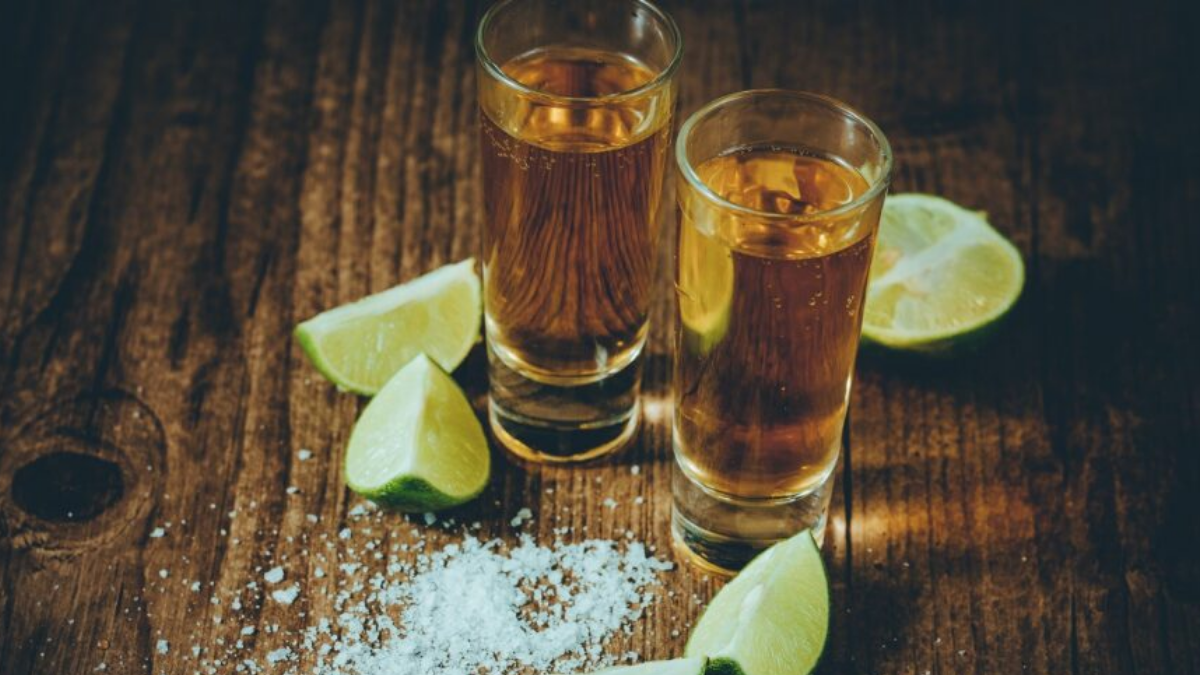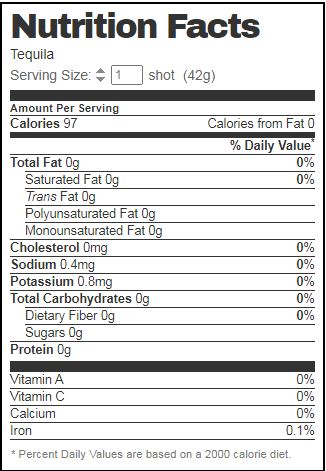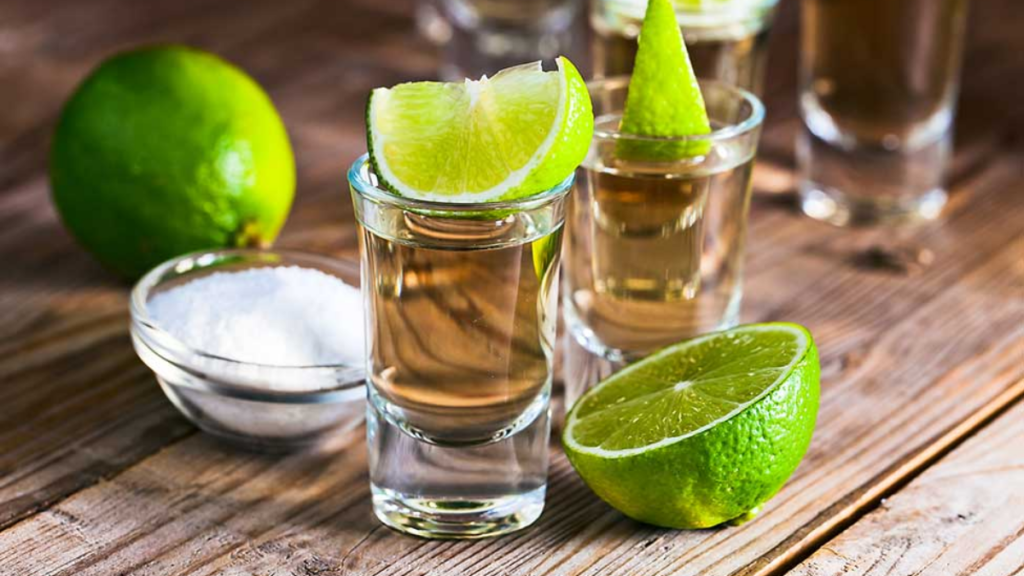Tequila is a distilled liquor made from the blue agave plant of Mexico’s pride and joy and the main ingredient in the acidic and tangy margarita beverage. Jalisco’s western Highlands and Tequila area are home to this succulent plant. Tequila is a protected term that refers to a liquor manufactured from blue agave and produced in territories designated by the Mexican government. Mezcal refers to other agave-based spirits. To know tequila nutrition facts, read further.
A jigger of tequila is one serving. A shot comprises around 42 grams of alcohol or 1.5 ounces. A single serving of tequila contains no carbohydrates. This beverage is usually sugar-free because it is distilled. Tequila is devoid of fiber.
Tequila Nutrition Facts
What is Tequila?
Tequila is blue agave-based beverage. It is an Americas-native succulent plant. Tequila is created from the pia, or heart, of the agave plant. It’s an underground bulb that grows to be enormous. It’s baked gently to turn the starch into sugar. Baked pina is sugared and fermented into alcohol.
It can only be created legally in the Mexican state of Jalisco, and Tequila is the town name where most of the production still takes place. It is frequently confused with mezcal, and while it is a form of mezcal, mezcal can be manufactured from any agave.
Types of Tequila
There are more than 300 different types of tequila on the market, and they range in color from completely pure to dark brown color. The aroma is similarly diverse, depending on what type of alcohol you consume. There are four main types of tequila:
- Blanco – A pure white or clear spirit that has been allowed to age for less than two months
- Reposado – Aged between 2 months and one year in oak barrels
- Anejo – Aged between 1 year and three years in oak barrels
- Extra Anejo – Aged for at least three years
What are the Health Benefits of Tequila?
Tequila has many benefits. Animal studies, for example, suggest that the blue agave used to manufacture tequila can help mice and fruit flies live longer by avoiding weight gain, controlling insulin levels, and prolonging their lifespan. However, there is little scientific data to back up these claims, and we don’t know if any of them apply to humans.
When drunk in moderation, alcohol may have health benefits. However, experts warn that there is a risk of side effects depending on the dose, and the USDA does not recommend that individuals who do not drink begin to do so, even if there are health benefits.
Stress Reduction
Scientific evidence supports the usage of alcohol to reduce stress. Studies have indicated that moderate alcohol use can assist in relieving stress over time. Recent research suggests that drinking a moderate amount of alcohol after a mental stressor may help you recover faster.
However, according to the National Institute on Drinking Abuse and Alcoholism (NIAAA), the link between stress and alcohol is complex. Using alcohol to cope with stress can have both psychological and physiological consequences.
Better Heart Health
According to several research, regular light to moderate alcohol consumption (one or two drinks per day for women, one or two drinks per day for males) is linked to a lower risk of total mortality, coronary artery disease, congestive heart failure, and stroke.
Reduced Diabetes Risk
According to research, light to moderate drinking has also been linked to a lower incidence of type 2 diabetes. Experts say alcohol and glucose control in type 2 diabetics are challenging. According to the authors of a 2015 study, overall dietary intake significantly impacts how alcohol affects insulin and glucose metabolism regulation. They point out that research findings on the relative advantages and hazards of alcohol intake among persons with this illness have been unclear.
Bone Health
Bone health and alcohol consumption have been studied. The majority of studies suggest that drinking alcohol harms bone health. However, a study in South Korean postmenopausal women found a connection between mild alcohol consumption (two to three times per week, one to two glasses per occasion) and high femoral bone mineral density. Light drinkers had a slightly higher incidence of osteoporosis than non-drinkers and heavy drinkers.
Is Tequila Healthier than Other Alcohols?
Any amount of alcohol can be harmful to one’s health. However, other varieties of alcohol have less sugar and carbohydrates and fewer empty calories and hence may have fewer negative health consequences. Tequila has no carbs, no sugar, and fewer calories than wines, beers, and ciders.
A 42 g shot of 100% tequila has 97 calories and 0 grams of carbs.
The table below compares one serving of various forms of alcohol to 1 serving of other types of alcohol:
| Products | Calories | Carbohydrates (g) |
| Beer (12 fl oz, one can) | 155 | 12.8 |
| Hard cider (12 fl oz, one can) | 202 | 21.3 |
| White wine (1 glass, 180 g) | 148 | 4.68 |
| Red WineTrusted Source (1 glass, 180 g) | 153 | 4.7 |
| RumTrusted Source, vodka, gin, whiskey, or brandy (42 g shot) | 97 | 0 |
| Alcoholic malt beverage (12 fl oz, one can) | 209 | 0.972 |
What are the Health Risks of Tequila?
Alcohol, which can be addicted, is a sensitive topic. According to the Centers for Disease Control and Prevention, women who are pregnant, those under the age of 21, and people suffering from alcoholism or who cannot control their drinking are among those who should not drink alcohol. It should also be avoided by persons who plan to drive or engage in any other activity requiring concentration, attention, and expertise.
Nationwide alcohol laws vary. The 2015-2020 Dietary Guidelines for Americans recommend moderate alcohol consumption. Moderate drinking for adults is one drink for women and two for men.
If consumed in excess, tequila will result in the following:
- Potential nausea
- Dizziness
- Lack of coordination
- Dehydration
- Constipation
- Headaches
- Vomiting
- Body aches
- Weakness
Tequila can intoxicate you. While hangovers are unlikely, excessive drinking will end in an unpleasant morning.
Contraindications
Some people should not drink alcohol at all, even in small amounts. Some OTC and prescription drugs, for example, cause drowsiness and should not be combined with alcohol. If you plan to drive or operate machinery, you should avoid consuming alcohol. Alcohol should not be consumed by anyone recovering from an alcohol use disorder or struggling with addiction. Those with celiac illness or gluten sensitivity should also check with the manufacturer to ensure their preferred beverage is gluten-free.
Storage and Food Safety
Tequila and other alcoholic beverages should be kept in a cold, dark place away from light and heat, and they should not be kept in the refrigerator. Tequila can last for decades if not opened. On the other hand, tequila producers recommend that you consume tequila within six months of opening it for the best taste and freshness. If your freezer is exceptionally cold, you can freeze tequila, but it is not suggested.
Conclusion
Blue agave, produced for whisky production, is used to make tequila. True tequila is produced in or around the Mexican state of Jalisco and bears the designation “Made in Mexico.” Blanco tequila, reposado tequila, enjoy tequila, and other types of tequila are available. Margaritas and tequila sunrises use tequila. Distilled liquor can also be drunk neat.
Some people feel drinking tequila has health benefits. Tequila can be part of a healthy diet in moderation, but it needs high-quality study to prove it. It is feasible to produce your tequila at home for people who truly enjoy this alcoholic beverage, but it is a time-consuming process. However, excessive alcohol intake can result in both short-term and long-term health hazards, such as aggression and injuries, addiction, alcohol misuse, and chronic diseases. Let’s look at the tequila recipe with these principles in mind.



